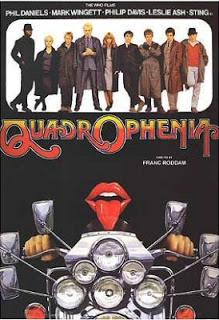
Directed By: Franc Roddam
Starring: Phil Daniels, Leslie Ash, Philip Davis
Tag line: "We are the mods, we are the mods. We are, we are, we are the mods"
Trivia: Writer / director Cameron Crowe has said in the past that this is his favorite movie
Like Tommy, Quadrophenia is based on a rock opera by The Who, though it differs from Ken Russell’s 1975 film in that it uses the group’s songs more sparingly. In place of a straight-up musical, director Franc Roddam instead gives us an intense coming-of-age tale, throwing the spotlight on a young man who eventually realizes his life is going nowhere.
The story takes place in 1960s London, when two groups: the Mods (thugs in suits who listen to R&B and ride around on scooters) and the Rockers (leather-clad gangs on motorcycles who love Rock and Roll), battled each other in the streets. Though he has a well-paying job as an office boy, Jimmy (Phil Daniels), a young Mod, lives for the weekend, when he and his pals take blue uppers by the handful and raise all sorts of hell. His parents (Michael Elphick and Kate Williams) are at their wits end, and threaten to throw him out of the house if he doesn’t shape up. But Jimmy couldn’t care less, and during a holiday trip to Brighton, he and his fellow Mods pick a fight with some Rockers that, before long, turns into an all-out riot. For Jimmy, those few days in Brighton were an absolute blast, but at the same time they have him wondering if there might be more to life than drugs, music, sex, and fighting.
A number of now-familiar faces show up in supporting roles throughout Quadrophenia, including Ray Winstone (billed as “Raymond”), making his big-screen debut as Kevin, an old buddy of Jimmy’s who, since his release from the army, has been dressing like a Rocker; and Timothy Spall as a projectionist at the advertising firm where Jimmy works. In addition, rock star Sting makes an appearance as Ace, a highly respected Mod who’s smack dab in the middle of the chaos in Brighton. All do a fine job in their brief roles, while Phillip Davis (as Chalky), Mark Wingett (as Dave), and Gary Shall (as Spider) light up the screen as Jimmy’s fellow Mods (not to mention his closest friends). Quadrophenia also features great music, both by The Who (along with the tunes from Quadrophenia, some of the group’s earlier hits, including “My Generation” and “Anyway, Anyhow, Anywhere”, play at regular intervals) and such ‘60s favorites as The Ronettes (“Be My Baby”), The Crystals (“Da Doo Ron Ron”), and The Kingsmen (“Louie Louie”).
More than anything, though, Quadrophenia is a story of youth and rebellion that’s based, in part, on actual events (a riot similar to the one in this film occurred in Brighton in May of 1964, when hundreds of Mods squared off against at least that many Rockers, leading to dozens of arrests and thousands of dollars in damage). Phil Daniels delivers a searing performance as Jimmy, whose biggest worry, as the movie opens, is where he can score blue pills, and whether or not he’ll hook up with Steph (Leslie Ash), a pretty blonde he’s had his eye on for some time. Through most of the film, we follow Jimmy and his pals as they break laws and bust heads, thumbing their noses at society and any authority figures (including their parents) that stand in their way.
It all leads up to the chaotic weekend in Brighton, which, at first, seemed like it was the high point of Jimmy’s young life (Not only did he have a romantic tryst with Steph, but he also fought the police, and even bonded momentarily with Sting’s character, Ace, the so-called “King” of the Mods). Upon his return home, however, Jimmy realizes nothing has changed. His friends still hang out on weekends, his parents don’t understand him, and his lucrative job suddenly feels meaningless. His greatest triumph (Brighton) behind him, Jimmy wonders “what’s next?” It’s at this point in the film that many of the songs from The Who’s Quadrophenia album take center stage, culminating with an incredible final scene (set to the tune “Love Reign O’er Me”) shot along the picturesque cliffs of Beachy Head in East Sussex.
It’s a dramatic ending to a motion picture that recreates a turbulent era in Britain’s history, a time when young people lived for the moment, only to realize they had nothing to hold onto once that moment faded away.
